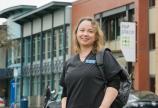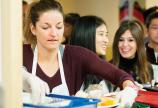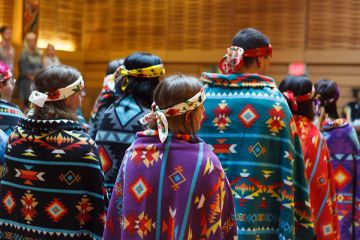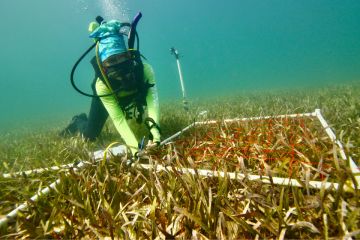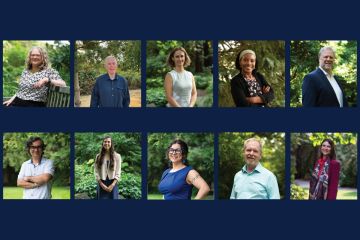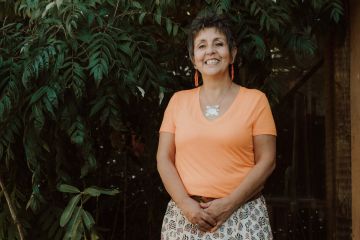A curriculum of care at Our Place
Human and Social Development, Peter B. Gustavson School of Business
- Kate Hildebrandt
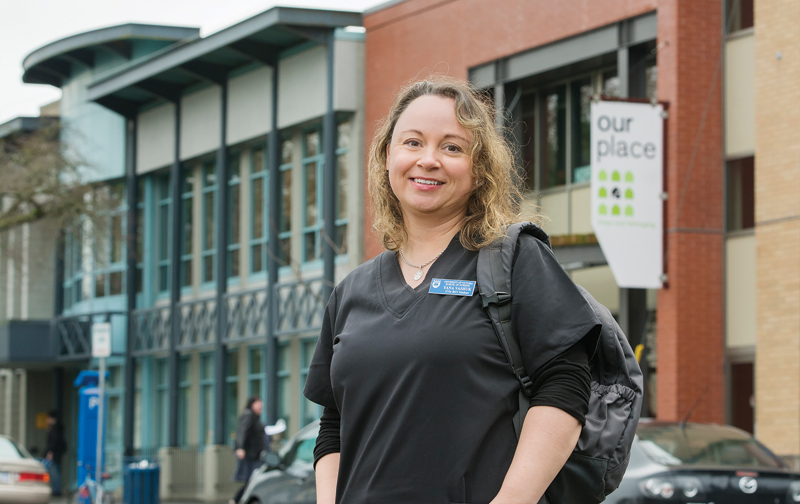
Two UVic collaborations serving vulnerable populations provide learning opportunities for students
Many people across Greater Victoria volunteer to improve the lives of our community’s most vulnerable people. UVic collaborations in nursing and business go a step further, shaping learning experiences in the spirit of service.
The longstanding Foot Hygiene Program delivered by fourth-year UVic nursing students at Our Place began by recognizing that the most vulnerable people often face the greatest barriers to wellness. That’s why the program is so valuable, explains Dr. Judy Burgess of the UVic Faculty of Human and Social Development. “Everyone benefits from this program and in many different ways.”
The key to the curriculum? By offering foot hygiene services, students also learn about other health factors these clients face and offer advice and referrals.
Nursing student Yana Vashuk wanted to do her fourth-year practicum at Our Place because she felt it was meaningful and worthwhile. “Street people are prone to foot problems. They walk so much in search of food and shelter. In winter, their feet get wet and in summer their feet become dry and calloused.” Twenty minutes with the Foot Hygiene team puts a smile on their face and makes them feel better, says Yana, also noting improved skin quality in repeat clients.
Burgess began working with Rev. Allen Tysick in 2008, then executive director of Our Place and now founder of the Victoria Dandelion Society, to create this innovative training practicum. The Our Place Society serves Greater Victoria’s most vulnerable including working poor, impoverished elderly, the mentally and physically challenged, those living with addictions, and the homeless.
Students are prepared to interact with their clients in a way that is non-threatening and supportive. In fact, this community placement program was designed exclusively for people from the street who comprise our region’s more than 1,200-person homeless population.
“This program informs our students about their nursing practice and provides a high-level service for those who need it most,” explains Tracy Shenton, sessional instructor and program supervisor. Shenton points out that while Our Place provides space as well as socks, gloves, towels, and cleaning supplies, UVic’s School of Nursing funds all other costs.
“This includes high-quality tools and equipment, disinfectants, soaps, moisturizers and socks,” Shenton explained. “We’re looking at about $600 per year, not including the cost for socks.” And then there’s the honorarium of $150 which goes to the certified foot care nurse who supervises the students’ preparation for placement. Students themselves hold fundraising events to help cover expenses, so designated donations are always welcome.
Putting service first: the business case
While nursing students were thinking feet-first about the health needs of Our Place clients, students from the Gustavson School of Business made a business case to improve one of the society’s most recognized and widely used services: meal service.
The scale of the problem is large, and unfortunately it’s getting larger. Our Place provides between 1,200 and 1,500 meals a day, and over the past year, they’ve increased services to the community by more than 30 per cent, resulting in challenges around space, staffing, volunteers and integration of services.
The Our Place Society served 526,884 meals in 2014.
This past fall, Gill Graduate School MBA students collaborated with the community organization to help them meet that growing demand.
“The students found that working with Our Place was both challenging and rewarding, resulting in recommendations that they feel confident will help streamline operations, reduce overhead, and allow the society to further extend their reach,” says Heather Ranson, a professor in the service management specialty in the Peter B. Gustavson School of Business.
“The MBA program is built around immersive experiences like ‘live case’ projects, helping to create long-lasting relationships between our students and groups within the community.”
The students’ service-oriented business study provided several recommendations including:
- extending meal service to 90 minutes from the current 60 minutes
- using software to track volunteer hours and reward volunteers individually
- developing a tracking system for food donation,
- providing conflict management training for all kitchen volunteers,
- inviting volunteers, when there are sufficient in number, to sit, have a conversation and eat with guests, and
- using music and lighting to make the facility more welcoming at meal time.
“Not only was this an opportunity for the students to engage first hand with the most vulnerable citizens of Victoria, it was a unique experience for everyone at Our Place Society,” says Le-Ann Dolan, director of operations at Our Place. “It was wonderful to engage with the university and the rewards were more than we were expecting.”
—
With files from Brian Cant
Photos
In this story
Keywords: nursing, community, health, philanthropy, student life, Our Place
People: Tracy Shenton, Le-Ann Dolan

